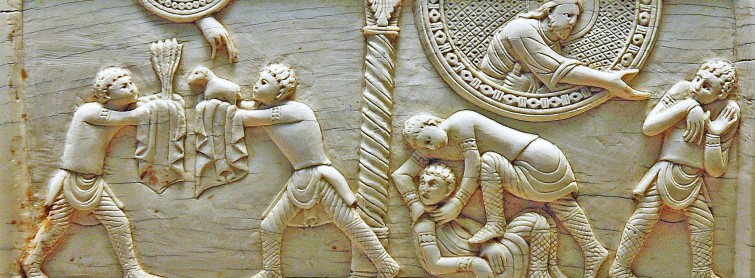The story of Cain and Abel is commonly known as the story of two brothers, one of whom murders the other in a fit of jealous rage. However, the story of Cain and Abel is so grounded in the creative narrative that this story also powerfully reflects God’s love for his creation, and demonstrates how deeply bonded He is, to the earth.
Creation is Offered
Genesis 4:2 describes Cain as a crop farmer and his younger brother Abel as a shepherd. Each man was responsible for a portion of God’s creation which they each cared for.
4:3 states that “Cain brought some of the fruits of the soil as an offering to the LORD”. Notice that Cain is the first to make his offering before God. This tells us that there is nothing inferior or unsuitable about his offering – in the eyes of the Lord; Cain’s grain holds just as much value as Abel’s animal sacrifice. Both animals and plants are equal as God’s creation and make a suitable sacrifice.
It is also significant that both brothers use a portion of creation to make their sacrifice. Cain is a farmer who brings a portion of his edible crops. Scripture does not indicate if this is his best produce or whether, perhaps he was bringing seconds or even inedible goods. Abel is a shepherd who is said to bring the ‘firstlings’–likely fattest of his flock – as a sacrificial contribution (Gen 4:4). Both brothers choose to bring the fruit of their work within creation as an offering, directly utilising God’s creation in their working life and in their devotional life.
Creation is Fallen
Cain’s ominous actions are bound up with the created order.
Cain said to his brother Abel, “Let us go out to the field.” And when they were in the field, Cain rose up against his brother Abel, and killed him. (v.8)
The act itself was committed outside, a point that is explicitly referenced within the story – twice. This is important – killing Abel is not just an offence against humanity, but an offence against the cosmos on a fundamental level.
When Cain commits the unspeakable, God asks where Abel is.
Then the Lord said to Cain, “Where is Abel your brother?” He said, “I do not know. Am I my brother’s keeper? (v.9)
Cain denies the crime outright, as if he could conceal his actions, and his sin from God. God doesn’t need an admission from Cain. He feels the full weight of Cain’s massacre upon God’s creation.
What have you done? The voice of your brother’s blood cries out to me from the ground. (v.10)
The earth cries out to God on Abel’s behalf. This cry is a demand for vengeance from the earth which has in some way absorbed the solemnity of Abel’s death. The details about this are scarce – perhaps Cain had buried Abel’s body in the ground hoping that his crime might go undetected, or perhaps in that fatal moment, Abel’s blood spilled on the ground. In any case, the earth took the burden of Abel’s death and cried out to God for justice. A similar story takes place in Luke where, if the people’s praises were silenced, the stones would cry out in praise (19:40). In Luke, the ground, the stones, and all of the created order recognise God as their creator and saviour, and yearn for redemption from its fallen-ness, through Him.
Creation is Angered
Genesis goes onto state;
So now you are cursed from the earth, which has opened its mouth to receive your brother’s blood from your hand (v.11)
We now know that Abel’s blood was not lying on the ground, openly spilt. The surface of the earth opened its mouth to receive it. Again, this may indicate that Cain buried Abel, in an attempt to cover up his transgression. We see this in Numbers, where we are told that;
…blood pollutes the land, and no expiation can be made for the land, for the blood that is shed in it. You shall not defile the land in which you live, in which I also dwell… (35:33-34)
God dwells in the land in Numbers, and in Genesis with Cain and Abel, and he finds blood to be a pollution upon his creation. The result of this pollution is that the earth will no longer co-operate with Cain. Cain has abused God’s created order and it now rejects him. Abel’s blood has damaged God’s relationship with creation, and separated him from it.
When you till the ground, it shall no longer yield its strength to you. A fugitive and a vagabond you shall be on the earth. (v.12)
In cursing the ground by murdering Abel, Cain has in turn been cursed by the ground. He is fated to live in the absence of his usual agricultural activity, wandering restlessly within a created order that no longer recognises him. This indicates a kind of ‘poetic justice’, where we recognise that the punishment has been established to fit the crime. Cain was an agronomic man who would have enjoyed in his work, so in keeping with the nature of his crime, God punishes him using the earth. Cain is ruined – the ground will no longer be fruitful for him, and he will no longer be able to produce a living from the work, and the life, that he has known up until this point.
The story of Cain and Abel sheds some light on God’s relationship with creation, and how he feels about us neglecting or directly harming any part of his created order. Become a part of the solution TODAY, by subscribing, and signing the petition to establish Creation Day as a national holiday.
http://www.ipetitions.com/petition/creation-day

